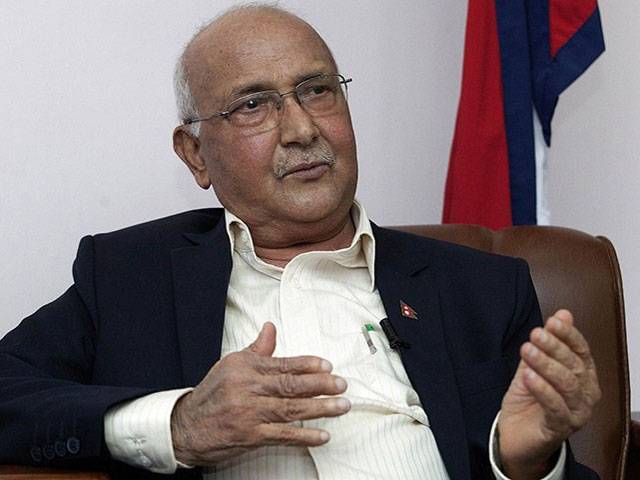KATHMANDU - A senior Nepali lawmaker, tipped to be the next prime minister, on Wednesday accused neighbouring giant India of breaking international law by deliberately halting cross-border trade, forcing the landlocked nation to ration fuel.
Since last Thursday, members of an ethnic minority living in Nepal’s southern plains have blocked a critical trade route into the country from India in protest over the new constitution adopted on September 20. Officials say cargo movement through other border checkpoints has also declined sharply since last week, sparking fears of a fuel shortage and long queues at petrol stations. K.P. Oli, chief of the ruling UML party, said the Indian government, rather than demonstrators, was responsible for the border stoppage, in an unofficial protest over its dissatisfaction over the constitution.
His comments reflect mounting public anger in Nepal where many accuse India of being behind the blockade. New Delhi has denied the allegations and urged dialogue with the protesters to end the stand-off. “India is saying those people (protesters) are in no man’s land, they are blocking the roads so (Indian trucks) are not being able to supply, that’s not true,” he said. “There is no gas, no vegetable supplies, no fuel for vehicles, no fuel for airlines, and life is about frozen,” Oli told AFP in an interview. “We don’t want this type of friendship.” “India should not violate the treaties and agreements between our two countries, one. Second, India shouldn’t undermine and violate the international norms and rights of the landlocked countries in general.”
More than 40 people have been killed in clashes between police and protesters representing ethnic minorities who say a new federal structure laid out in the constitution will leave them under-represented in the national parliament.
New Delhi, fearing instability on the border, has criticised Nepal for rushing the constitution rather than resolving the concerns of the minorities, many of whom have relatives living in India.
Oli is seen as the top candidate when parliament votes on a new prime minister to head the government in coming weeks in the wake of the constitution’s adoption. His comments signify a stronger stand against India which has traditionally exerted significant political influence in Nepal.
The Indian Oil Corporation is the sole supplier of fuel to Nepal.
As cross-border trade slowed to a crawl, with hundreds of trucks backed up at checkpoints in the plains, home to half the country’s population, Nepal this week began rationing fuel and decided to limit the number of vehicles allowed on the roads.
The new constitution, Nepal’s first to be drawn up by elected representatives, is the final stage in a peace process that began when Maoist rebels laid down their arms in 2006 after a decade-long insurgency.
Work on the new constitution began in 2008 after the Maoists won parliamentary elections and abolished the monarchy. But power-sharing squabbles between parties stymied progress.
Lawmakers finally reached agreement in June this year, spurred by a massive earthquake two months earlier that killed nearly 8,900 people.
Friday, April 19, 2024
Nepali leader accuses India of ‘breaking int’l law’

8:27 AM | April 19, 2024
8:09 AM | April 19, 2024
Opposition objects to oath-taking of MNAs amid lawlessness
5:15 PM | April 19, 2024
Electioneering to end on Friday night ahead of by-polls in 21 constituencies
5:14 PM | April 19, 2024
Fawad Chaudhry granted bail in 14 cases related to May 9 violence
5:13 PM | April 19, 2024
British Army chief lauds Pakistan Army's professionalism, expertise
5:12 PM | April 19, 2024
Israeli aircraft fire missiles at Air Force assets in Iran: Report
3:52 PM | April 19, 2024
A Tense Neighbourhood
April 19, 2024
Dubai Underwater
April 19, 2024
X Debate Continues
April 19, 2024
Hepatitis Challenge
April 18, 2024
IMF Predictions
April 18, 2024
Kite tragedy
April 19, 2024
Discipline dilemma
April 19, 2024
Urgent plea
April 19, 2024
Justice denied
April 18, 2024
AI dilemmas unveiled
April 18, 2024
ePaper - Nawaiwaqt
Advertisement
Nawaiwaqt Group | Copyright © 2024





